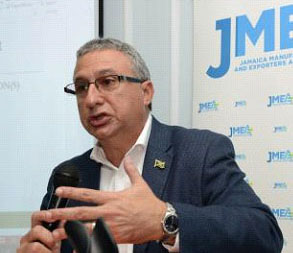(Jamaica Gleaner) Jamaica continues to pay dearly for corruption, with an estimated five per cent of the gross domestic product lost each year to the practice, amounting to millions of dollars. This is a serious indication of the failure of successive administrations to do more than talk about this most egregious of crimes, according to president of the Jamaica Manufacturers and Exporters Association (JMEA) Metry Seaga.
“This is US$$738 million of our hard-earned money,” the businessman told yesterday’s weekly meeting of the Rotary Club of Kingston at The Jamaica Pegasus hotel in New Kingston.
While noting that business confidence was restored in 2018 and that the nation was back on a relatively good path of economic recovery, with employment on the rise, he is concerned that the economic advancement will be derailed unless key issues such as corruption are addressed. Seaga further charged that there is no indication that the growing disease is being given the priority attention it deserves.
“Enough is not being done to eradicate the cancer of corruption,” he bluntly declared, citing the 2017 International Narcotics Control Strategy report prepared by the United States Department of State, which described corruption in Jamaica as being “entrenched and widespread”.
“Similarly, the World Economic Forum, in its Global Competitiveness Report, ranked Jamaica as being among the world’s worst countries on ‘the business costs of crime and violence’. The Transparency International Global Corruption Barometer, in 2016, found that some 86 per cent of Jamaicans viewed our own policemen and women as corrupt while 85 per cent felt the same way about the country’s political parties and the Parliament,” he pointed out, adding that the country did not need international institutions to state what is widely known.
Seaga explained: “The misuse of public office for private gain is blatant. So is the prevalence of corruption in most, if not all, the government institutions. It is evidence that some of the persons who are employed to put an end to corruption have themselves become complicit in the crime. Ladies and gentlemen, the anti-corruption rules are either inadequate, or government agencies are too weak to enforce them.”
As a result, the impact of this all-consuming disease on many aspects of national development has reached overwhelming proportions, according to the JMEA president.
He told the Rotarians: “It eats away at our economic growth, gives rise to crime, suffocates productivity, threatens border security, and significantly damages the international reputation of our country. It has a disproportionate impact on the most vulnerable, reducing their access to services – including health, education, and justice – and increases the cost of living.”
“How can we continue to cry out for investments if we are not creating a framework that allows for investors to feel safe and one that allows for the benefits of these investments to be reaped?” an obviously frustrated Seaga asked, going on to make a national plea for unity to defeat this all-powerful common enemy.
“Today, I want to urge the relevant authorities, for the sake of our nation’s future, we need to get into the practice of naming, shaming, and sternly and impartially prosecuting. I am calling on the policymakers, business leaders, and civil society to join in the call for initiatives to increase transparency and accountability, which must go hand-in-hand with reform and the strengthening of our legal institutions. Let’s end the talk and actively eliminate the disease wherever it exists,” Seaga declared.





